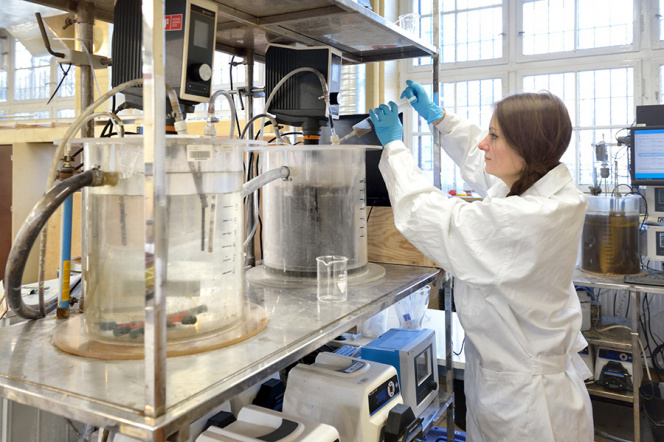Date added: 2022-01-24
Scientists will turn food waste into compounds more valuable than biogas

The project, carried out under the supervision of prof. Jacek Mąkinia from Gdańsk University of Technology and prof. Xiang Li from Donghua University in Shanghai, is a response to the global challenge posed by wasting food and, consequently, the accumulation of food waste. It is estimated that the population of 7 billion generates annually about 1.3 billion tons of food waste, while per household it is respectively 54 kg in Poland (the EU average is 76 kg) and 16 kg in China.
Acids instead of renewable energy
As part of the REVAMP project, the Polish-Chinese research team will work on recovering valuable products from the fermentation of food waste through sonocavitation and hydrothermal intensification. Scientists will work with local waste and study how it affects the efficiency of the fermentation process.
– Anaerobic digestion is one of the commonly used technologies for the processing of food waste. Until now, the aim was to maximize energy recovery in the form of biogas, but this approach has been questioned in terms of economic benefits and the principles of sustainable economy. In our project, we propose the recovery of the so-called compounds with high added value, such as carboxylic acids, in the acid fermentation process - says Prof. Jacek Mąkinia. – Carboxylic acids and their derivatives are important due to their use in the production of synthetic polymers, pharmaceuticals, solvents or food additives. The global market for these acids is predicted to grow by 5 percent annually, reaching approximately $ 20 billion in 2023.
Scientists will compare methods of processing waste with different characteristics using two methods of hydrothermal treatment. They will investigate key processing by-products and micro-aeration strategy to regulate fermentation mechanisms. In addition, they will develop a mathematical model (this is the field of specialization of Prof. Mąkinia's team) to evaluate and optimize the work of an integrated system including the process of pre-treatment and fermentation of food industry waste.
Cavitation in engineering – among the leading world researchers
The team of prof. Grzegorz Boczkaj from the Department of Process Engineering and Chemical Technology at the Faculty of Chemistry, Gdańsk Tech, also takes part in the project, and will be responsible for research on the preparation of the charge (processed food waste) using the sonocavitation phenomenon for fermentation processes. This is to improve the intensity of fermentation.
– The destructive nature of the cavitation phenomenon enables, among others, induction and acceleration of a number of chemical reactions. In the case of sonocavitation, i.e. acoustic cavitation, this effect is obtained using ultrasound – explains Prof. Grzegorz Boczkaj. – The energy released in the liquid stream at the moment of implosion of cavitation bubbles can be used to obtain the desired structural and physico-chemical transformations of properly prepared food waste in order to increase its bioavailability for microorganisms that are used in fermentation processes.
The research team from Gdańsk Tech is currently at the forefront of research teams involved in the use of cavitation in chemical and environmental engineering.
Advanced methods of modeling and optimization of processes
Developing an integrated model combining the pre-treatment of food waste and acid fermentation processes, targeting the production of carboxylic acids and their derivatives will be a challenge for scientists.
– Modification of the existing, typical fermentation models will be possible thanks to the recognition of microbial activity, intermediate fermentation products and nitrogen transformation. The model will be used as a tool to better understand the processes, optimize operating conditions and estimate the environmental impact of the studied processes, says PhD Ewa Zaborowska from the research team of the project, who has been working at Gdańsk Tech for many years on innovative technologies in sewage and sludge management in combination with advanced mathematical modeling methods (thanks to the simulation models developed so far, wastewater treatment plants and agricultural biogas plants can optimize technological processes in terms of the effectiveness of removing pollutants or obtaining valuable products, improving the energy balance, or reducing greenhouse gas emissions).
Cooperation with scientists from China
The three-year project on the Polish side has obtained almost 1 million funding from the National Science Center as part of the international SHENG 2 competition for Polish-Chinese research projects. On the Chinese side, the competition is organized by the National Natural Science Foundation of China.
Collaboration of the team of prof. Mąkinia with scientists from Donghua University started in 2019. Its result is a number of publications in renowned scientific journals (Journal of Hazardous Materials, Bioresouce Technology, Environmental Research). Last year, prof. Mąkinia became the laureate of the "High-level Global Experts" program at Donghua University, as part of which he delivered a series of lectures for Chinese students and doctoral students.

